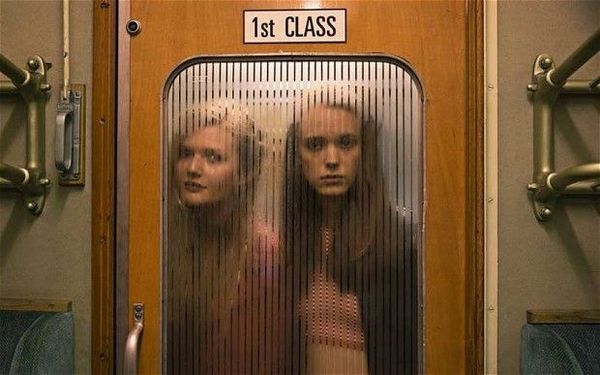Eye For Film >> Movies >> Nymphomaniac (2013) Film Review
Nymphomaniac
Reviewed by: Jennie Kermode

Back in 2011, at the Cannes Film Festival, two things happened involving Lars Von Trier. First, he announced that he was going to make a porn film. Second, he caused a scandal by saying that he understood Hitler and that finding out he had Nazi heritage "gave [me] some pleasure." Now the promised porn film is here, heavy with comment on the latter incident, and sticking its tongue out at the censor with erudite glee. It's a film that goes out of its way to provoke and disappoint, but to those who get its jokes and can cope with the rest, it's a delight.
To call this a porn film is really stretching definitions to the point of absurdity. Yes, there's a lot of sex in it, but relatively little of it is joyful. There's also a lot of maths, literature, and conversation about fly fishing. In the second part of the film (most cinemas are showing it divided into two halves), about 40 minutes go by with no sex at all, and Von Trier goes on to explore erotic taboos in a way that will exceed most viewers' comfort levels, though it never feels gratuitous in the context of what the film has to say. He's also keen to explore the many ways that sex can fail, and to position it in the context of equally troubled romance, refusing to allow porn its traditional cosy existence in isolation from the rest of the world.

Along the way, much mischief is made at the expense of the cliches of porn magazine stories. From two attractive young women competing to have sex with as many men on a train as they can to the (white) heroine finding herself sandwiched between two black men whose language she doesn't speak, the film playfully rips all the fun out of a genre nobody was really meant to take seriously in the first place, sometimes replacing it with human misery, sometimes with sardonic wit. The scene in which a casual lover unexpectedly leaves his wife and three children is replete with horror yet played as a farce, taking a swipe at the sex comedies of the Sixties - yet Von Trier never mocks eroticism itself, only its popular packaging. He has his own sense of fun which often manifests through homages, taking in everything from Le Feu Follet to Last Tango In Paris. There's even a cheerful scene comparing penises that resembles nothing so much as the deliberate censor-bait at the end of Monty Python's The Meaning Of Life.
Holding all this together is another classic porn narrative that dates right back to De Sade - that of the older woman recounting the adventures of her youth. Here Charlotte Gainsbourg turns in a career-best performance, less direct but just as complicated as she was in Antichrist. (One delicious scene has her briefly placed opposite Willem Dafoe at his least showy and most sinister.) Stacy Martin, also very good, plays her younger self, and there are a range of strong supporting turns, notably from Christian Slater as her father and Uma Thurman as the aforementioned jilted wife (aspects of the film recall Thurman vehicle Kill Bill). Shia LaBeouf, as Jerôme, love of the heroine's life, is required to be weak and listless in a way he can do well, yet gives viewers an emotional route into the story when she is at her most stubbornly distant; he's the classic everyman hero of porn; were he actually sexy, it wouldn't work.
The film's closest cousin in recent cinema is Shame, both exploring the notion of sex addiction and both featuring protagonists who risk losing what they love most because of their actions. Von Trier, however, is far more critical in his approach, with Stellan Skarsgård (as the listener) delivering a rant toward the end about the extent to which the heroine's understanding of her own identity - like others' reactions to it - has been shaped by gender. It's a blunt technique but one entirely in keeping with an unsubtle genre, and overall the film feels more realistic and less dependent on clichés than McQueen's work, for all that it draws on stereotype. Von Trier humanises not only his protagonist but even his minor characters; though we see many lovers only briefly, we get a glimpse into each of them, a fleeting awareness of a life impacted by a desire that seems to be bigger than any human being. There's also none off the prettiness or self-justification of Shame here; this desire seems functional rather than exciting right from the outset. This is about a need for sex like the need for oxygen; it is the fantasy of insatiability stripped of all its romance, and it reveals, in the process, just how sentimental porn is.
Although it has its weak points and the ending is problematic, this remains an important film, taking on subjects that too little is said about and doing it with style. Like sex, it could thrill you or leave you feeling drained, depending on what you are willing to give. It's certainly worth four hours of commitment.
Reviewed on: 01 Mar 2014
















